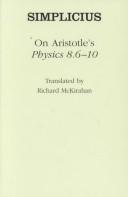
On Aristotle's "Physics 8.6-10"
By Simplicius of Cilicia
Subjects: Physics, Science, ancient, Early works to 1800, Motion, Ancient Science, Science, Ancient, Physics, early works to 1800
Description: "Aristotle's Physics is about the causes of motion and culminates in a proof that God is needed as the ultimate cause of motion. Aristotle argues that things in motion need to be moved by something other than themselves - he rejects Plato's self-movers. On pain of regress, there must be an unmoved mover. If this unmoved mover is to cause motion eternally, it needs infinite power. It cannot, then, be a body, since bodies, being of finite size, cannot house infinite power. The unmoved mover is therefore an incorporeal God.". "Simplicius reveals that his teacher, Ammonius, harmonized Aristotle with Plato to counter Christian charges of pagan disagreement, by making Aristotle's God a cause not only of beginningless movement, but also of beginningless existence of the universe. Eternal existence, no less than eternal motion, calls for an infinite, and hence incorporeal, force. This anti-Christian interpretation turned Aristotle's God from a thinker into a certain kind of Creator, and so helped to make Aristotle's God acceptable to Saint Thomas Aquinas in the thirteenth century."--BOOK JACKET.
Comments
You must log in to leave comments.